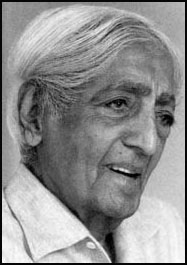940 What is religion?
Krishnamurti - as always - tells it like it is: Religion is not what you think it is.
I have dealt with the same subject matter in one of my essays: GOD 2

True religion
Do you know what religion is? It is
not the chant, it is not in the performance of puja, or any other ritual, it is
not in the worship of tin gods or stone images, it is not in the temples and
churches, it is not in the reading of the Bible or the Gita, it is not in the
repeating of a sacred name or in the following of some other superstition
invented by men. None of this is religion.
Religion is the feeling of goodness, that love which is like the river moving everlastingly. In that state
you will find there comes a moment when there is no longer any search at all;
and this ending of search is the beginning of something totally different.
The
search for God, for truth, the feeling of being completely good - not the
cultivation of goodness, of humility, but the seeking out of something beyond
the inventions and tricks of the mind, which means having a feeling for that
something, living in it, being it - that is true religion.
But you can do that
only when you leave the pool you have dug for yourself and go out into the
river of life. Then life has an astonishing way of taking care of you, because
then there is no taking care on your part. Life carries you where it will
because you are part of itself; then there is no problem of security, of what
people say or don’t say, and that is the beauty of life.
The Book of Life, December 16,
HarperSanFrancisco, 1995
________________________________________
I have just come
across a New Scientist text by A. C. Grayling I had picked up awhile ago, What is this thing called religion? He points out a distinction between religion and religiosity.
This is because "religion" and "religiosity" are very ill-defined terms. Today's major religions are relatively young, and they share features - such as belief in a single supernatural agent that is actively interested in the affairs of human individuals - which are novelties compared to most of history's religions. What a Roman or Greek of the classical period believed was quite different. For the Romans, religion was a matter of public social cohesion rather than personal spirituality, and the attitude of individuals to their household gods and guardian deities was equivalent to a form of knocking-on-wood superstition, useful chiefly for protection and luck.
Moreover it is not clear that "primitive" religions were religions at all, as we have come to understand the concept; they were more like rudimentary forms of science and technology. It seems likely that their espousers did not regard gods and spirits as supernatural, but as straightforward parts of nature, operating in fairly systematic ways as instigators of wind, thunder and other natural phenomena, and amenable to manipulation through sacrifice and observance of taboo. There is a marked difference between someone who holds contemporary Christian evangelical views and an ancient Egyptian who literally felt his god on his back - Ra, the sun - every day of the week.
To think that there is something in
the brain or its function which specifically gives rise to
"religiosity" is not consistent with the idea of major differences
between what we now think of as religion and what people long ago believed and
did. It is plausible that a generalised propensity to credulity in childhood is
a successful evolutionary adaptation, and that this might have been culturally
annexed by religion as social complexity increased. If so, the concept of
religiosity is going to need all the historical and anthropological
clarification it can get before a computational model of its dynamics becomes
possible.